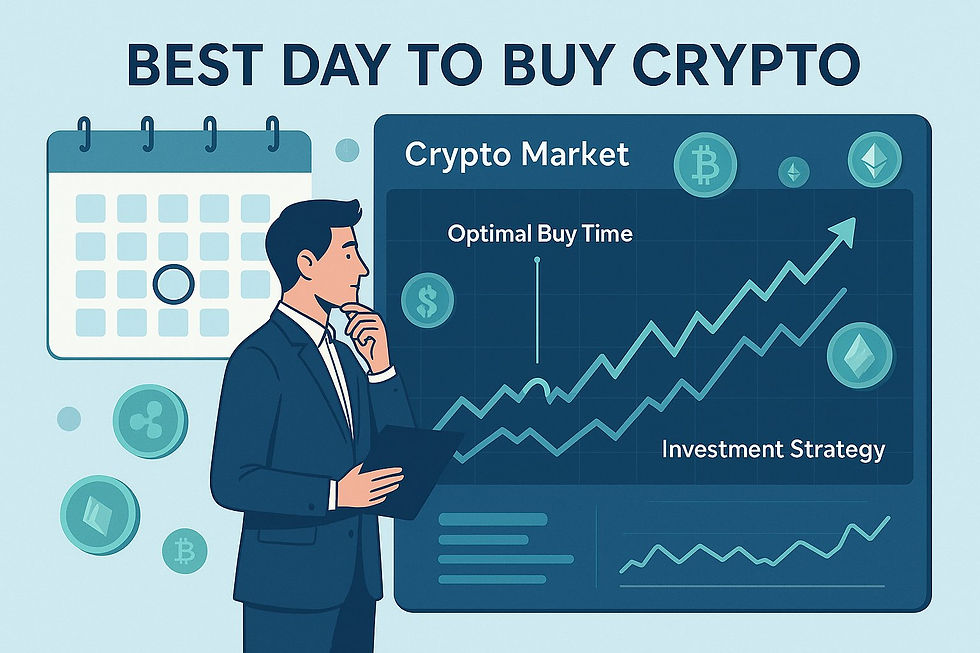Best Time of Day to Buy Crypto: Timing Your Investment for Maximum Value
- Tomás Varga, Former Quant Researcher

- Sep 4, 2025
- 3 min read
Cryptocurrency trading never really stops. You can buy or sell digital assets at any hour—midnight, lunch break, whenever. Unlike the stock market, which shuts down on weekends and holidays, crypto just keeps going, and that gives investors a lot of chances to jump in. But with all this nonstop action, when’s actually the best time to buy?

Recent market data suggests that the afternoon and early evening hours in the U.S. usually offer the best windows to buy cryptocurrency. When you look at major coins like Bitcoin and Ethereum, those time slots often have better prices. Trading activity and price swings tend to settle into similar rhythms across the big-name cryptos.
Spotting these timing patterns can help you make smarter choices about when to enter the market. It’s not really possible to nail the timing every time—crypto’s just too wild for that. But if you can catch some of the trends, you might get a slight edge.
Key Takeaways
Afternoon and evening hours usually give you the best shot at snagging crypto at a good price
Perfect timing isn’t realistic, but watching for patterns can help
Dollar-cost averaging is still the safest bet for most investors—time of day or not
Key Factors That Influence Optimal Buying Times
Several factors shape when you’ll get the best deals on crypto. Weekly cycles show certain trends, each coin has its own quirks, and transaction fees can shift throughout the day.
Day of the Week Patterns in Crypto Prices
Mondays and Tuesdays often bring better buying opportunities. Data shows prices tend to dip after weekend selling pressure.
Lots of traders offload their positions after weekend moves, so there’s more supply floating around on Monday mornings.
Tuesdays often continue this, with prices staying low as the market absorbs Monday’s action. There’s usually less buying demand early in the week.
Weekend effects can’t be ignored. Lower trading volume on Saturdays and Sundays sometimes leads to price drops that spill into Monday.
The best time of day to buy really depends on the coin. Bitcoin sticks to the Monday-Tuesday dip more reliably than most altcoins.
Mid-week activity tends to pick up from Wednesday through Friday, as institutional traders get back in the game and prices can climb.
Cryptocurrency-Specific Timing (Bitcoin, Ethereum, Solana)
Bitcoin has some of the clearest timing patterns, probably because of its sheer size. Early mornings can be a decent time to buy, at least for bitcoin.
Each coin dances to its own beat, though. Bitcoin’s volatility usually chills out during off-peak hours, while smaller coins can get jumpy anytime.
Ethereum is a bit different. Its price often moves with network activity and gas fees, which spike during busy hours.
Ethereum prices often follow the ups and downs of DeFi activity, which usually hits its stride during U.S. and European business hours.
Solana and other newer coins? They’re all over the place. Smaller market caps make them more sensitive to shifts in trading volume.
So, it’s worth thinking about each coin’s quirks. The bigger the market cap, the more timing seems to matter for getting a good entry price.

Slippage and Transaction Costs Across Market Hours
Slippage tends to spike when trading volume drops, especially in the early morning or on weekends.
If you're moving big amounts of crypto, you'll probably notice more slippage during those quieter times. It just makes sense to aim for high-volume hours if you're planning a substantial buy.
Transaction costs jump around too, depending on how busy the network or exchange gets. Sure, peak hours can mean higher fees, but you also get smoother trades and more liquidity.
How much risk are you willing to tolerate? Some folks would rather pay a bit extra in fees just to make sure their orders go through quickly when the market's buzzing.
Exchange differences can really shake up your timing strategy. Certain platforms just do better liquidity-wise at specific times, which helps keep slippage down if you're dealing with bigger trades.
Honestly, smart crypto trading is kind of a balancing act—chasing lower prices but sometimes swallowing higher transaction costs. What's "best" really depends on your trade size and what you're after.





















































Comments